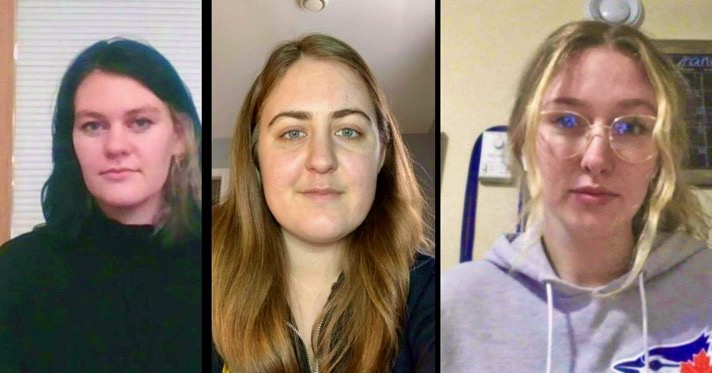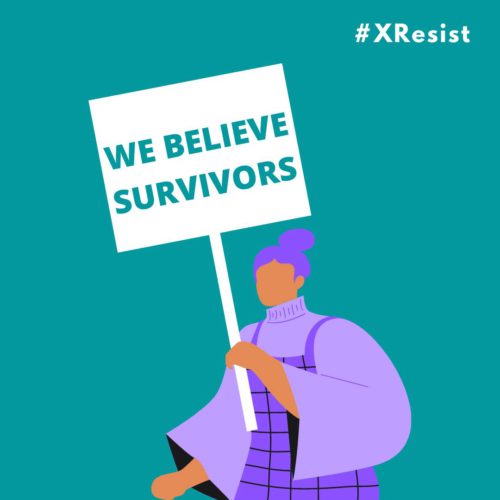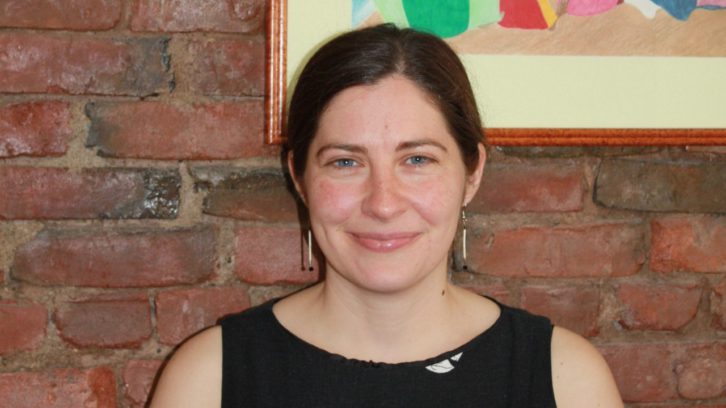Sexual assault
St. FX students protest as man acquitted of sexual assault returns to campus
Group formed in 2018 upset by university’s decision to allow his return

caption
Marin MacBeath, Addy Strickland, and Emma Kuzmyk in a Zoom meeting. The St. FX students are organizing protests in response to St. FX allowing a man acquitted of sex assault to return to campus.Editor's Note
This is Part 1 of a two-part series on a St. FX student acquitted of sexual assault returning to campus. Part 2 will deal with the outcome of the criminal case.
A music student at St. Francis Xavier University is returning to campus after he was acquitted of sexual assault, but students and advocates are frustrated by the school’s decision.
The matter is raising difficult questions about how universities create and uphold survivor-centric responses to sexual assault complaints, and ensure a fair process for those accused.
In October, Luke Letourneau was found criminally not guilty of a sexual assault alleged to have occurred on campus in 2017. The university’s internal investigation in the spring of 2018 had found him responsible and suspended him for the following school year. Students were outraged by the university’s decision to overturn his suspension in the fall of 2018 without informing his accuser.
The case made national headlines in 2018 when protests denounced the university’s handling of the case. Related stories
Emma Kuzmyk, a fourth-year St. FX student who was on campus when the case went public, said last week’s news that Letourneau is returning this semester brings “an overwhelming sentiment of sadness.”
Kuzmyk is a member of X-Resist, a group that came together in response to the university’s handling of the case at the time. Kuzmyk, with fellow students Addy Strickland and Marin MacBeath, is organizing a virtual protest at St. FX as students are doing the first two weeks of this semester online.
From last Wednesday, the first day of classes, students have been changing their Zoom screens while attending online classes to teal-coloured images with slogans that say, “We believe survivors.” They also are sharing statistics from RAINN.org that state the extremely low rates of false reporting (two to four per cent), and even lower conviction rates (one per cent) in sexual assault cases.
Kuzmyk said they are only just getting started with their response. The three recently had a productive meeting with the students’ union executive and are looking at ways they can work together.
“I think what we’re really trying to do now is just display solidarity with the survivor however we can,” she said.
The complainant, whose name is still protected by a publication ban, said she is grateful for the student’s renewed protests at St. FX.
“[When] I first heard about it, it made me very emotional to know that there still that much support and that much belief, despite the court acquittal, at the school,” she said.
“I’m really proud of them for continuing to speak for what’s right. They did so three years ago when the school mishandled it originally. And they’re speaking out again now to let the school know they’re not going to stand for this.”

caption
St. FX University has made changes to the way it deals with sexualized violence on campus since this case went public in 2018.Letourneau was acquitted after a trial in Nova Scotia Supreme Court in October 2020. In her decision, Justice Denise Boudreau said she had “serious doubts” about the credibility of the complainant, who claimed she couldn’t remember critical moments of the alleged assault.
The Signal has learned that students closely connected with the case were contacted last week via Zoom to inform them of Letourneau’s return. As he was found not guilty of sexual assault, St. FX vice-president of students, Elizabeth Yeo, stated in a letter provided to The Xaverian Weekly, “the university has no basis for disallowing his admittance.”
Requests for comment from The Signal were not returned.
The Signal attempted to contact Letourneau via his Facebook page, but he did not respond. His page was taken down shortly after. The Signal also tried to contact Letourneau for a comment through his lawyer, but Letourneau declined.
St. FX University has made changes to the way it deals with sexualized violence on campus since this case went public in 2018.
The history of the case
The complainant was an 18-year-old first-year student in November of 2017. Letourneau was 24 years old and also a first-year student who lived in the same residence.
The complainant told The Signal last Wednesday that when she first contacted St. FX in January 2018, she just wanted him out of residence.
The university did an investigation, and, according to documents provided to The Signal by Letourneau’s lawyer, Hector MacIsaac, after a hearing on March 21, 2018, the university’s judicial board found Letourneau responsible for violating Community Code Major H — “engaging in sexual harassment and/or sexual assault” — and suspended him.
The complainant later heard Letourneau was appealing the suspension and she decided to report the alleged assault to the RCMP.
She returned to campus in the fall of 2018 assuming Letourneau would not be on campus because she had not received notification of any change in decision from the university.
On the first day of classes, she discovered Letourneau was back and greeting new students at the campus radio station. She was shocked and went to the student life director to ask what was happening. She said she was told Letourneau had won his appeal and had been allowed to return to campus pending the criminal case.
“I couldn’t breathe. I was shaking and crying. I called my mom,” she said. “I was so panicked and telling her I need to come home, I can’t do this anymore and that day, she booked me a flight.”
The complainant left campus and never returned.
“You know, I [had] said my piece at that point, and this school didn’t care,” she said. “And I wasn’t gonna stay at a school that didn’t care for my safety.”
After students and faculty protested and the story made national headlines, the university’s president said Letourneau should withdraw and had left campus.
In a public letter in October 2018, St. FX President Kent MacDonald said “I acknowledge and accept the fact that we can do better.
“In this particular case, there were clear gaps in communication and apparent issues relating to our appeal processes that negatively affected our university community and, in some cases, retraumatized victim/survivors. For this, I am sorry.”

caption
Images from the X-Resist campaignX-Resist: Student and faculty movement
More than 100 people attended the first meeting of X-Resist in October 2018.
Chris Frazer, a St. FX history professor, was one of the group’s founding members. When the group came together, they said the feeling among them was “enough is enough.”
“There has been a long history of sexual assault at St. FX, which gets swept under the carpet. And we decided that it was time to press the university to finally do something about this instance but also about the way that it handles sexual assault period on campus.”
Emma Kuzmyk remembers the response among students on campus at the time.
“There was definitely some outrage,” she said. “People were very angry.”
Kuzmyk said there had been several incidents of sexualized violence on campus in her first year. They motivated her to speak up, join several committees dealing with sexualized violence on campus, and to join a movement called We Stand Together, which raised money for a peer support program.
In the beginning, she said, she remembers feeling discouraged, and that it might not be possible to make any real changes.
“But there’s such a strong community of activists here and of people who want to get involved, that we’ve actually been able to make some really concrete changes,” Kuzmyk said, “including the new sexualized violence policy and the implementation of the sexualized violence response advocate, which has been really great to see.”
Wyanne Sandler, executive director of the Antigonish Women’s Resource Centre and Sexual Assault Services Association, agrees that the response from the campus community to this case spurred the university to make some important changes to how they deal with sexualized violence on campus.

caption
Wyanne Sandler is the Executive Director of the Antigonish Women’s Centre and Sexual Assault Services AssociationThe new sexual violence policy is much stronger and more survivor-centred than it was before, Sandler said in an email to The Signal.
St. FX introduced its first stand-alone Sexual Violence Policy in 2016. But 2020’s updated policy includes measures like the creation of the Sexual Violence Prevention and Response Advocate (SVPRA), a specially trained, full-time position to support survivors through disclosure and reporting processes.
The Signal asked for an interview with Heather Blackburn, the current SVPRA, but did not receive any response from the university.
The new policy encompasses the entire St. FX community, not just students but also faculty, staff, and others on campus. It also states that there is no time limit for reporting or disclosure.
It grants access to immediate measures for all survivors, even if they choose not to disclose or report the violence. These measures include safety planning, academic accommodations, and residence relocation. Disciplinary measures for students found in an investigation to have violated the policy include suspension and expulsion.
“However, I think this particular case demonstrates just how much work remains to be done,” Sandler said.
Sandler also points out that the university’s response to sexual violence on campus does not need to mirror the legal system.
“We’ve seen St. FX threaten heavy penalties (including expulsion) for breaking COVID-19 protocols,” Sandler said, “which for me begs the question of why the outcomes for violating the sexual violence policy wouldn’t be as strong?”
The concern is not only the possibility of risk to student safety, Sandler said, but the damage to the trust and legitimacy of the university’s own policies and procedures. If the response is seen as inadequate, survivors will be even less likely to come forward and report.
Sexual assault is significantly under-reported, with approximately nine in 10 incidents (88 per cent) never being reported to the police, according to Nova Scotia’s Community Services.
Chris Frazer finds it hard to comprehend how Letourneau’s return to campus could fit within the school’s new “survivor-centric” sexual violence policy.
“It’s like trying to square a circle,” Frazer said, “I don’t see how it can happen, [how it] can be. They need to be asked that question.”
The Signal has contacted the university multiple times to ask that question and has not received a response.
“It seems to me that what is needed on this campus,” Frazer said, “is a significant upheaval and overturning of what I would describe as a still existing rape culture at St. FX.”
Resources for those impacted by sexualized violence in Nova Scotia
N.S. Mental Health Crisis Line 1-888-429-8167
Good2TalkNS 1-833-292-3698 | Text “GOOD2TALKNS” to 686868
St. FX Sexual Violence Prevention and Response Advocate 902-867-5601
The Antigonish Women’s Resource Centre and Sexual Assault Services Association 902-863-6221
St. FX Peer Support Program: Bloomfield 417 (Reopening January 25)
Correction:
About the author
Rose Murphy
Rose Murphy is a multimedia journalist in Nova Scotia. She is interested in stories about unusual characters, small business, resilient communities,...
